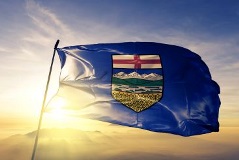Government of Alberta Plans to Improve Interprovincial Trade

As a professional regulatory body, APEGA welcomes the provincial government’s announcement to increase interprovincial free trade, including the improvement of processes and the strengthening of language to enhance labour mobility among provinces. APEGA has a long history of recognizing out-of-province professional credentials in Alberta quickly and efficiently to get new Albertans working as soon as possible.
“As the regulator for engineering and geoscience in Alberta, APEGA supports the provincial government’s commitment to removing cumbersome barriers to employment,” said Jay Nagendran, P.Eng., APEGA registrar and chief executive officer. “APEGA has a fast interprovincial application process in place for licensing professionals. We strive to get engineers and geoscientists to work in our province as quickly as possible, helping build our economy, develop Alberta’s resources and drive diversification for our province’s value-add industries.”
The provincial government’s announcement addresses removing exceptions under the 2017 Canadian Free Trade Agreement related to recognizing professional and trades qualifications among provinces. In addition to licensing individuals, APEGA issues permits to companies qualified to practise engineering, geoscience or both in Alberta. The changes, when they come, will likely mean more permit applications. APEGA will evaluate internal processes and adjust as required to respond efficiently to this increase.
The regulator is committed to sustaining a high standard of fast and efficient processing of interprovincial applications, both individual and corporate. APEGA looks forward to working with the Government of Alberta to implement changes thoroughly, seamlessly and effectively.
Professional Mobility and APEGA
For at least two decades, APEGA has been a national leader on the movement of professional labour between Canadian jurisdictions. The association joined other Canadian regulators as signatories to inter-association mobility agreements—one in 1999 for engineers and another in 2001 for geoscientists. These agreements led to continuous improvement of APEGA’s processes and processing times, along with improved cooperation between the regulators, reflecting many of the principles and goals of the internal trade agreements that followed.
Once APEGA receives necessary documentation, transfer applications for professional engineer (P.Eng.) or professional geoscientist (P.Geo.) take five to seven business days to process.
APEGA is required under Alberta law to protect the public through self-regulation, as laid out in the Engineering and Geoscience Professions Act (EGP Act), the General Regulation, and APEGA’s bylaws. APEGA requires, for example, that before being accepted, an applicant be a professional member in good standing from the originating self-regulatory organization.
APEGA issues permits to companies that engage in the practices of engineering, geoscience or both. Each company practising in Alberta must have a valid permit to practice. The permit to practice requires employers to reflect in their procedures and processes the same ethics, skill and knowledge standards required of professional engineers and professional geoscientists.
The 12-page application for a permit to practice is straightforward but thorough, requiring company information and declarations. It currently takes about two weeks for APEGA to process a valid permit application.
